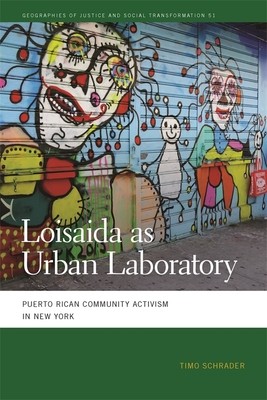
- We will send in 10–14 business days.
- Author: Timo Schrader
- Publisher: University of Georgia Press
- ISBN-10: 0820357979
- ISBN-13: 9780820357973
- Format: 15.2 x 22.9 x 1.3 cm, softcover
- Language: English
- SAVE -10% with code: EXTRA
Reviews
Description
Loisaida as Urban Laboratory is the first in-depth analysis of the network of Puerto Rican community activism in New York City's Lower East Side from 1964 to 2001. Combining social history, cultural history, Latino studies, ethnic studies, studies of social movements, and urban studies, Timo Schrader uncovers the radical history of the Lower East Side. As little scholarship exists on the roles of institutions and groups in twentieth and twenty-first-century Puerto Rican community activism, Schrader enriches a growing discussion around alternative urbanisms.
Loisaida was among a growing number of neighborhoods that pioneered a new form of urban living. The term Loisaida was coined, and then widely adopted, by the activist and poet Bittman "Bimbo" Rivas in an unpublished 1974 poem called "Loisaida" to refer to a part of the Lower East Side. Using this Spanglish version instead of other common labels honors the name that the residents chose themselves to counter real estate developers who called the area East Village or Alphabet City in an attempt to attract more artists and ultimately gentrify the neighborhood. Since the 1980s, urban planners and scholars have discussed strategies of urban development that revisit the pre-World War II idea of neighborhoods as community-driven and ecologically conscious entities. These "new urbanist" ideals are reflected in Schrader's rich historical and ethnographic study of activism in Loisaida, telling a vivid story of the Puerto Rican community's struggles for the right to stay and live with dignity in its home neighborhood.EXTRA 10 % discount with code: EXTRA
The promotion ends in 18d.03:41:57
The discount code is valid when purchasing from 10 €. Discounts do not stack.
- Author: Timo Schrader
- Publisher: University of Georgia Press
- ISBN-10: 0820357979
- ISBN-13: 9780820357973
- Format: 15.2 x 22.9 x 1.3 cm, softcover
- Language: English English
Loisaida as Urban Laboratory is the first in-depth analysis of the network of Puerto Rican community activism in New York City's Lower East Side from 1964 to 2001. Combining social history, cultural history, Latino studies, ethnic studies, studies of social movements, and urban studies, Timo Schrader uncovers the radical history of the Lower East Side. As little scholarship exists on the roles of institutions and groups in twentieth and twenty-first-century Puerto Rican community activism, Schrader enriches a growing discussion around alternative urbanisms.
Loisaida was among a growing number of neighborhoods that pioneered a new form of urban living. The term Loisaida was coined, and then widely adopted, by the activist and poet Bittman "Bimbo" Rivas in an unpublished 1974 poem called "Loisaida" to refer to a part of the Lower East Side. Using this Spanglish version instead of other common labels honors the name that the residents chose themselves to counter real estate developers who called the area East Village or Alphabet City in an attempt to attract more artists and ultimately gentrify the neighborhood. Since the 1980s, urban planners and scholars have discussed strategies of urban development that revisit the pre-World War II idea of neighborhoods as community-driven and ecologically conscious entities. These "new urbanist" ideals are reflected in Schrader's rich historical and ethnographic study of activism in Loisaida, telling a vivid story of the Puerto Rican community's struggles for the right to stay and live with dignity in its home neighborhood.

Reviews